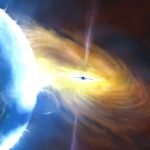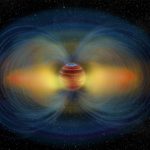Earth and Venus are not the only volcanic planets anymore, shows study
Imagine an Earth-sized planet that’s not at all Earth-like.
Half this world is locked in permanent daytime, the other half in permanent night, and it’s...
Unraveling the mysteries of a luminous quasar, J1144
The most luminous quasar, known as SMSS J114447.77-430859.3 or simply J1144, has been observed in X-ray emissions.
This observation provides a fresh understanding of how...
Daniel K. Inouye Solar Telescope releases new detailed images of the sun
The National Science Foundation's (NSF) Daniel K. Inouye Solar Telescope, the world's most powerful ground-based solar observatory, has released eight new high-definition images of...
This is the largest explosion ever seen in the universe
Throughout recorded history, humans have looked up at the night sky and witnessed the major astronomical events known as a “supernova.”
The name, still used...
A peek into star explosions
When stars like our sun finish their lifespan, they don't exactly go out with a bang. Instead, they do something more like a quiet...
The splendid Lupus 3: A star-forming marvel in the cosmos
A Brief Introduction to Lupus 3
Picture a massive, star-forming cloud in the depths of the cosmos, known as Lupus 3.
This celestial body has been...
Dark matter detection: Radio telescopes could uncover dark photons
Researchers from Tsinghua University, the Purple Mountain Observatory, and Peking University have proposed a new way to detect dark matter using radio telescopes.
Dark matter,...
Day-Night Dichotomy and Eternal Eruptions: Unveiling the Peculiarities of Planet LP 791-18d
In an intriguing development, astronomers have discovered an Earth-sized planet named LP 791-18d, which is unlike any planet we've seen before.
This celestial body is...
Early galaxies and the puzzle of their mass: insights from James Webb space telescope
The recent findings from the James Webb Space Telescope have raised intriguing questions about the earliest galaxies in the universe.
Initial observations indicate that these...
First extrasolar radiation belt detected
Discovery and Method
A team of astronomers has detected the first radiation belt outside our solar system, according to a study published on May 15...










